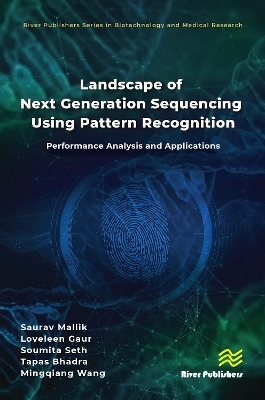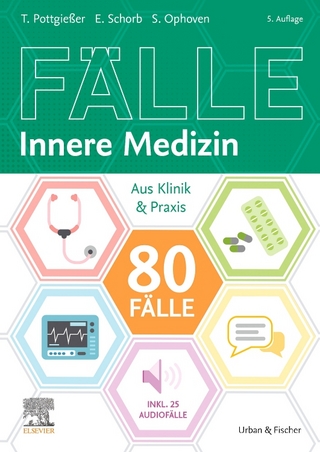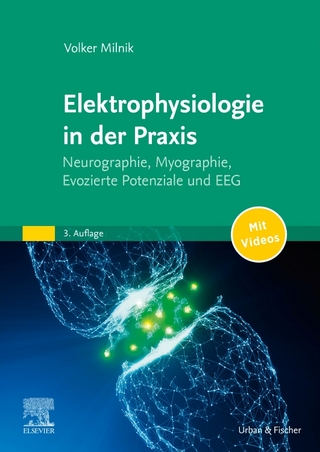
Landscape of Next Generation Sequencing Using Pattern Recognition
River Publishers (Verlag)
978-87-7004-151-5 (ISBN)
This book focuses on an eminent technology called next generation sequencing (NGS) which has entirely changed the procedure of examining organisms and will have a great impact on biomedical research and disease diagnosis. Numerous computational challenges have been brought on by the rapid advancement of large-scale next-generation sequencing (NGS) technologies and their application. The term ""biomedical imaging"" refers to the use of a variety of imaging techniques (such as X-rays, CT scans, MRIs, ultrasounds, etc.) to get images of the interior organs of a human being for potential diagnostic, treatment planning, follow-up, and surgical purposes. In these circumstances, deep learning, a new learning method that uses multi-layered artificial neural networks (ANNs) for unsupervised, supervised, and semi-supervised learning, has attracted a lot of interest for applications to NGS and imaging, even when both of these data are used for the same group of patients.
The three main research phenomena in biomedical research are disease classification, feature dimension reduction, and heterogeneity. AI approaches are used by clinical researchers to efficiently analyse extremely complicated biomedical datasets (e.g., multi-omic datasets. With the use of NGS data and biomedical imaging of various human organs, researchers may predict diseases using a variety of deep learning models. Unparalleled prospects to improve the work of radiologists, clinicians, and biomedical researchers, speed up disease detection and diagnosis, reduce treatment costs, and improve public health are presented by using deep learning models in disease prediction using NGS and biomedical imaging. This book influences a variety of critical disease data and medical images.
Dr. Saurav Mallik is currently working as Research Scientist in the Department of Pharmacology and Toxicology, The University of Arizona, USA. Previously, he worked as Postdoctoral Fellow in Harvard T.H. Chan School of Public Health, University of Texas Health Science Center at Houston, and University of Miami Miller School of Medicine, USA. He obtained his Ph.D. degree in the Department of Computer Science and Engineering from Jadavpur University, Kolkata, India in 2017 with his Ph.D. works carried out in the Machine Intelligence Unit, Indian Statistical Institute, Kolkata, India as Junior Research Fellow and Visiting Scientist. He obtained the award of Research Associateship from CSIR (Council of Scientific and Industrial Research), MHRD, Govt. of India in 2017. Dr. Mallik has published more than 130 research papers in different top high impact factor peer-reviewed international journals, conferences and book chapters having H-index 19. He is working as the active member of Institute of Electrical and Electronics Engineers (IEEE), USA, ACM and American Association for Cancer Research (AACR), USA and Bioclues, India. He has also worked with section editors and reviewers with several well-reputed high impact journals. His research interest includes computational biology, knowledge retrieval and data mining, bioinformatics, bio-statistics and machine learning/deep learning. Professor Loveleen Gaur is currently working as Professor, Program Director Artificial Intelligence and Data Analytics at Amity University, India. She has more than 20 years of teaching, research, and administrative experience internationally. She is the founding director of the postgraduate programme in Artificial Intelligence and Data Analytics in Amity International Business School. She is supervising a number of Ph.D. scholars, Post Graduate students, mainly in Artificial Intelligence and Data Analytics for business and management. Under her guidance, the AI/Data Analytics research cluster has published extensively in high-impact factor journals and has established extensive research collaboration globally with several renowned professionals. She is a senior IEEE member and Series Editor with CRC and Wiley. She has high indexed publications in SCI/ABDC/WoS/Scopus, has several patents/copyrights to her credit, and has edited/authored more than 20 research books published by world-class publishers. An ample number of Ph.D. and Master’s students have graduated under her supervision. She is an external Ph.D./Master thesis examiner/evaluator for several universities globally. She has completed internationally funded research grants successfully. Professor Gaur has significantly contributed to enhancing scientific understanding by participating in over three hundred scientific conferences, symposia, and seminars, by chairing technical sessions and delivering plenary and invited talks. Dr. Soumita Seth is currently serving as an Assistant Professor in the Department of Computer Science and Engineering of Future Institute of Engineering and Management, Kolkata, India, Affiliated to MAKAUT, Kolkata. Previously, she worked as Assistant Professor in the Department of Computer Science and Engineering of Brainware University, Kolkata (March 2023 to August 2023) and in the Department of Computer Science and Engineering of Pailan College of Management and Technology, Kolkata, India, Affiliated to MAKAUT, Kolkata (February 2022 to March 2023). In addition, she recently submitted her Ph.D. thesis to the Department of Computer Science & Engineering (CSE) from a state-government university, Aliah University (AU), Kolkata, India. Previously, she completed M.Tech. and B.Tech. from the departments of CSE and IT, respectively. She is also collaborating her Ph.D. research with The University of Texas Health Science Center at Houston (UTHealth), Houston, USA. She has academic experience of almost 6 years, research experience of 2 years, and industrial experience of 2 years. Dr. Seth has more than 10 research papers in different top high impact factor peer-reviewed international journals, conferences and book chapters. She has also worked with section editors and section reviewers with several well-reputed high impact journals. Her research interests include computational biology, data mining, bioinformatics, pattern recognition, biological regulatory networks, statistical application on bioinformatics, machine learning/deep learning. Dr. Tapas Bhadra has worked as an Assistant Professor in the Department of Computer Science and Engineering, Aliah University, Kolkata, India since 2015. He completed Ph.D. from the Department of Computer Science and Engineering of Jadavpur University, Kolkata, India in 2018. Prior to this, he was an INSPIRE Fellow in the Machine Intelligence Unit, Indian Statistical Institute, Kolkata from 2011 to 2015. He has co-authored more than 30 research papers having H-index 7. His research interests include pattern recognition, data mining, computational biology, and bioinformatics. Dr. Mingqiang Wang is currently working as postdoctoral scholar in the Department of Cardiovascular Institute, School of Medicine, Stanford University, USA. He previously worked in the Department of Center of Precision Health in University of Texas Health Science Center, Houston, Texas, USA as Postdoctoral Research Fellow. He obtained his Ph.D. degree in the Department of Bioinformatics from Chinese University of Hong Kong, Shatin, Hong Kong in 2018 and Master in Science from Chinese Academy of Sciences, Beijing, China in 2016. Dr. Wang has published many articles in various top international journals and conferences associated with bioinformatics. His research interest includes bioinformatics and computational genomics.
1. Introduction: Fundamentals of Next Generation Sequencing, Pattern Recognition, Biomedical Images 2. Integrating DNA Methylation, Linear Regression and Machines Learning on RNA-seq Data 3. Multi-objective Optimization-based Association Rule Mining Integral Approach for Optimal Ranking and Directional Signature Classification of Multi-omic Data 4. Dimensionality Reduction, Clustering and Biomarkers Discovery on Single-cell RNA-seq Data 5. Application of Detecting Discriminant Features from Stationary Nucleotide Base Pattern to the Classification of Essential Genes 6. Integrating Deep Learning and Next Generation Medical Image Data for Rare Disease Stage Detection 7. Conclusions and Scope for Further Research
| Erscheinungsdatum | 30.08.2024 |
|---|---|
| Reihe/Serie | River Publishers Series in Biotechnology and Medical Research |
| Zusatzinfo | 44 Tables, black and white; 19 Line drawings, color; 2 Line drawings, black and white; 11 Halftones, color; 1 Halftones, black and white; 30 Illustrations, color; 3 Illustrations, black and white |
| Verlagsort | Gistrup |
| Sprache | englisch |
| Maße | 156 x 234 mm |
| Gewicht | 530 g |
| Themenwelt | Medizin / Pharmazie ► Medizinische Fachgebiete ► Radiologie / Bildgebende Verfahren |
| Medizin / Pharmazie ► Physiotherapie / Ergotherapie ► Orthopädie | |
| Studium ► 2. Studienabschnitt (Klinik) ► Anamnese / Körperliche Untersuchung | |
| Technik ► Elektrotechnik / Energietechnik | |
| Technik ► Medizintechnik | |
| Technik ► Umwelttechnik / Biotechnologie | |
| ISBN-10 | 87-7004-151-2 / 8770041512 |
| ISBN-13 | 978-87-7004-151-5 / 9788770041515 |
| Zustand | Neuware |
| Informationen gemäß Produktsicherheitsverordnung (GPSR) | |
| Haben Sie eine Frage zum Produkt? |
aus dem Bereich


